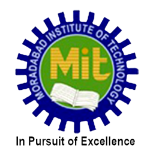
Department of Mechanical Engineering
( NBA Accredited )
PO’s (Program Outcomes)
Engineering Graduates will able to:
- Engineering knowledge: Apply the knowledge of mathematics, science, engineering fundamentals, and an engineering specialization to the solution of complex engineering problems.
- Problem analysis: Identify, formulate, review research literature, and analyze complex engineering problems reaching substantiated conclusions using first principles of mathematics, natural sciences, and engineering sciences.
- Design/development of solutions: Design solutions for complex engineering problems and design system components or processes that meet the specified needs with appropriate consideration for the public health and safety, and the cultural, societal, and environmental considerations.
- Conduct investigations of complex problems: Use research-based knowledge and research methods including design of experiments, analysis and interpretation of data, and synthesis of the information to provide valid conclusions.
- Modern tool usage: Create, select, and apply appropriate techniques, resources, and modern engineering and IT tools including prediction and modeling to complex engineering activities with an understanding of the limitations.
- The engineer and society: Apply reasoning informed by the contextual knowledge to assess societal, health, safety, legal and cultural issues and the consequent responsibilities relevant to the professional engineering practice.
- Environment and sustainability: Understand the impact of the professional engineering solutions in societal and environmental contexts, and demonstrate the knowledge of, and need for sustainable development.
- Ethics: Apply ethical principles and commit to professional ethics and responsibilities and norms of the engineering practice.
- Individual and team work: Function effectively as an individual, and as a member or leader in diverse teams, and in multidisciplinary settings.
- Communication: Communicate effectively on complex engineering activities with the engineering community and with society at large, such as, being able to comprehend and write effective reports and design documentation, make effective presentations, and give and receive clear instructions.
- Project management and finance: Demonstrate knowledge and understanding of the engineering and management principles and apply these to one’s own work, as a member and leader in a team, to manage projects and in multidisciplinary environments.
- Lifelong Learning: Recognize the need for, and have the preparation and ability to engage in independent and life-long learning in the broadest context of technological change.
Program Educational Objectives
The objectives of the Department of Mechanical Engineering are to produce graduates who will have the:
PEO 1:
Employability and entrepreneurial skills for making career in industries, academia, government services and as an entrepreneur.
PEO 2:
Potential to apply fundamental concepts of mechanical engineering, engineering science and practical training in solving mechanical engineering problems and to contribute in development of technologies.
PEO 3 :
Skills to apply leadership, managerial and administrative qualities to lead the projects professionally and ethically.
Program Specific Outcomes (PSO)
Mechanical Engineering graduates will be able to:
PSO 1:
Identify and solve problems of thermal engineering, strength of materials, fluid mechanics, refrigeration & air conditioning, Design, dynamics of machines, mathematics and engineering science.
PSO 2:
Get fundamental knowledge and hand-on experience of different manufacturing processes, material testing techniques and CAD/CAM tooling to apply in various industries.
PSO 3:
Learn quality and industrial management concepts, communication and soft skills along with other interdisciplinary subjects such as programming language, electrical engineering and basic electronics to enhance their employability.

